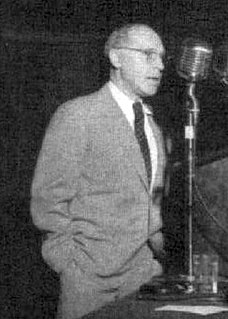A Quote by Richard Dawkins
Natural selection is all about the differential success of rival DNA in getting itself transmitted vertically in the species archives.
Related Quotes
The basic formulation, or bare-bones mechanics, of natural selection is a disarmingly simple argument, based on three undeniable facts (overproduction of offspring, variation, and heritability) and one syllogistic inference (natural selection, or the claim that organisms enjoying differential reproductive success will, on average, be those variants that are fortuitously better adapted to changing local environments, and that these variants will then pass their favored traits to offspring by inheritance).
Group selection and individual selection are just two of the selection processes that have played important roles in evolution. There also is selection within individual organisms (intragenomic conflict), and selection among multi-species communities (an idea that now is getting attention in work on the human microbiome). All four of these levels of selection find a place in multi-level selection theory.
Natural Selection is not Evolution. Yet, ever since the two words have been in common use, the theory of Natural Selection has been employed as a convenient abbreviation for the theory of Evolution by means of Natural Selection, put forward by Darwin and Wallace. This has had the unfortunate consequence that the theory of Natural Selection itself has scarcely ever, if ever, received separate consideration.
The theory of natural selection is the centerpiece of The Origin of Species and of evolutionary theory. It is this theory that accounts for the adaptations of organisms, those innumerable features that so wonderfully equip them for survival and reproduction; it is this theory that accounts for the divergence of species from common ancestors and thus for the endless diversity of life. Natural selection is a simple concept, but it is perhaps the most important idea in biology.
Now let me step back from the problem and very generally discuss natural selection and what we know about it. I think it is safe to say that we know for sure that natural selection, as a process, does work. There is a mountain of experimental and observational evidence, much of it predating genetics, which shows that natural selection as a biological process works.
I think the use of language is a very important means by which this species, because of its biological nature, creates a kind of social space, to place itself in interactions with other people. It doesn't have much to do with communication in a narrow sense; that is, it doesn't involve transmission of information. There is much information transmitted but it is not the content of what is said that is transmitted.
When I was working on my Ph.D., I developed a computer algorithm to look for rapid changes in populations' DNA. Our DNA changes constantly over generations, but if certain changes spread through a population more quickly than others, they are probably the beneficial results of natural selection. This is the protection we give ourselves to survive.
In particular, I argue that in both evolution and creation we have rival religious responses to a crisis of faith-rival stories of origins, rival judgments about he meaning of human life, rival sets of moral dictates, and above all what theologians call rival eschatologies-pictures of the future and of what lies ahead for humankind.
































